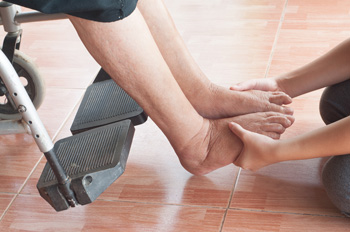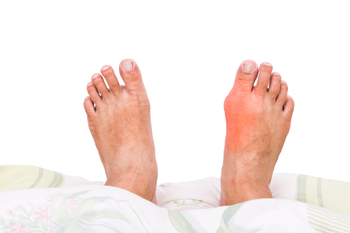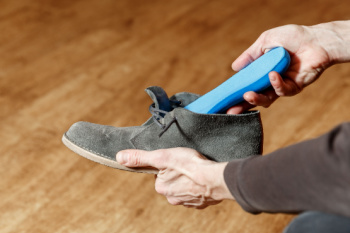Blog
Items filtered by date: March 2024
The Importance of Foot Check-Ups For Older Adults
 Regular foot assessments and timely management of foot-related issues in older adults play a huge role in maintaining mobility and reducing the risk of falls, which are major concerns for this age group. The feet can change in structure and function as people age. Especially when paired with conditions such as arthritis, diabetes, and circulatory problems, this can significantly impact a person’s ability to walk and perform daily activities safely. By addressing these issues early through routine podiatry care, potential problems can be managed or corrected before they lead to more serious complications and falls. This approach helps older adults both retain their motor performance and independence, as well as reduce their fear of falling. Fear itself can lead to a decrease in physical activity, further diminishing muscle strength and balance, which increases the risk of falls. It is suggested that elderly people with possible foot and aging concerns make regular appointments with a podiatrist, to address any potential problems quickly.
Regular foot assessments and timely management of foot-related issues in older adults play a huge role in maintaining mobility and reducing the risk of falls, which are major concerns for this age group. The feet can change in structure and function as people age. Especially when paired with conditions such as arthritis, diabetes, and circulatory problems, this can significantly impact a person’s ability to walk and perform daily activities safely. By addressing these issues early through routine podiatry care, potential problems can be managed or corrected before they lead to more serious complications and falls. This approach helps older adults both retain their motor performance and independence, as well as reduce their fear of falling. Fear itself can lead to a decrease in physical activity, further diminishing muscle strength and balance, which increases the risk of falls. It is suggested that elderly people with possible foot and aging concerns make regular appointments with a podiatrist, to address any potential problems quickly.
Proper foot care is something many older adults forget to consider. If you have any concerns about your feet and ankles, contact Dr. Dean D. Hinners from Illinois. Our doctor can provide the care you need to keep you pain-free and on your feet.
The Elderly and Their Feet
As we age we start to notice many changes in our body, but the elder population may not notice them right away. Medical conditions may prevent the elderly to take notice of their foot health right away. Poor vision is a lead contributor to not taking action for the elderly.
Common Conditions
- Neuropathy – can reduce feeling in the feet and can hide many life-threatening medical conditions.
- Reduced flexibility – prevents the ability of proper toenail trimming, and foot cleaning. If left untreated, it may lead to further medical issues.
- Foot sores – amongst the older population can be serious before they are discovered. Some of the problematic conditions they may face are:
- Gouging toenails affecting nearby toe
- Shoes that don’t fit properly
- Pressure sores
- Loss of circulation in legs & feet
- Edema & swelling of feet and ankles
Susceptible Infections
Diabetes and poor circulation can cause general loss of sensitivity over the years, turning a simple cut into a serious issue.
If you have any questions please feel free to contact one of our offices located in Metropolis and Eldorado, IL . We offer the newest diagnostic and treatment technologies for all your foot and ankle needs.
Causes and Treatment for Ingrown Toenails

Ingrown toenails can turn simple movements into a painful experience and even lead to infections if left untreated. Ingrown toenails develop when a toenail grows into the surrounding skin, particularly prevalent in the big toe. Factors like wearing ill-fitting footwear, genetics, improper nail trimming, or trauma are common causes of ingrown toenails. Symptoms can include pain, swelling, and redness around the affected nail. Prevention involves wearing properly fitted shoes with roomy toe boxes, trimming nails straight across, and avoiding tight socks. For help in managing severe, infected, or recurring ingrown toenails, treatment from a podiatrist is suggested. This foot doctor can prescribe antibiotics for infections or surgical removal of the toenail, if necessary. A podiatrist can also recommend methods to avoid ingrown toenails in the future. It is suggested that you schedule an appointment with a podiatrist at the first sign of an ingrown toenail.
Ingrown toenails may initially present themselves as a minor discomfort, but they may progress into an infection in the skin without proper treatment. For more information about ingrown toenails, contact Dr. Dean D. Hinners of Illinois. Our doctor can provide the care you need to keep you pain-free and on your feet.
Ingrown Toenails
Ingrown toenails are caused when the corner or side of a toenail grows into the soft flesh surrounding it. They often result in redness, swelling, pain, and in some cases, infection. This condition typically affects the big toe and may recur if it is not treated properly.
Causes
- Improper toenail trimming
- Genetics
- Improper shoe fitting
- Injury from pedicures or nail picking
- Abnormal gait
- Poor hygiene
You are more likely to develop an ingrown toenail if you are obese, have diabetes, arthritis, or have any fungal infection in your nails. Additionally, people who have foot or toe deformities are at a higher risk of developing an ingrown toenail.
Symptoms
Some symptoms of ingrown toenails are redness, swelling, and pain. In rare cases, there may be a yellowish drainage coming from the nail.
Treatment
Ignoring an ingrown toenail can have serious complications. Infections of the nail border can progress to a deeper soft-tissue infection, which can then turn into a bone infection. You should always speak with your podiatrist if you suspect you have an ingrown toenail, especially if you have diabetes or poor circulation.
If you have any questions, please feel free to contact one of our offices located in Metropolis and Eldorado, IL . We offer the newest diagnostic and treatment technologies for all your foot care needs.
Bunion Treatment

Bunions manifest primarily as the big toe angling towards the other toes, causing a bony protrusion on the inner edge of the foot. Symptoms include pain, swelling, callused skin, and foot shape changes. Treatment aims to alleviate discomfort and may involve painkillers, orthotics, or surgery for severe cases. Untreated bunions can worsen and lead to complications like arthritis or toe misalignment. Bunions are more prevalent in women, possibly due to footwear choices like high heels. Other causes of bunions include genetics, arthritis, and ill-fitting shoes. Prevention involves wearing properly fitting shoes with ample toe room, and avoiding tight or high-heeled footwear. Surgery is often the only solution for severe cases but may not guarantee complete recovery. If you have a bunion that causes you pain, it is suggested that you make appointments with a podiatrist for regular monitoring and treatment.
If you are suffering from bunion pain, contact Dr. Dean D. Hinners of Illinois. Our doctor can provide the care you need to keep you pain-free and on your feet.
What Is a Bunion?
Bunions are painful bony bumps that usually develop on the inside of the foot at the joint of the big toe. As the deformity increases over time, it may become painful to walk and wear shoes. Women are more likely to exacerbate existing bunions since they often wear tight, narrow shoes that shift their toes together. Bunion pain can be relieved by wearing wider shoes with enough room for the toes.
Causes
- Genetics – some people inherit feet that are more prone to bunion development
- Inflammatory Conditions - rheumatoid arthritis and polio may cause bunion development
Symptoms
- Redness and inflammation
- Pain and tenderness
- Callus or corns on the bump
- Restricted motion in the big toe
In order to diagnose your bunion, your podiatrist may ask about your medical history, symptoms, and general health. Your doctor might also order an x-ray to take a closer look at your feet. Nonsurgical treatment options include orthotics, padding, icing, changes in footwear, and medication. If nonsurgical treatments don’t alleviate your bunion pain, surgery may be necessary.
If you have any questions, please feel free to contact one of our offices located in Metropolis and Eldorado, IL . We offer the newest diagnostic and treatment technologies for all your foot care needs.
Wounds That Don't Heal Need to Be Checked
Benefits of Custom Orthotics for Older Adults

Many older adults have foot and ankle problems that affect their daily activities, balance, and quality of life. These issues, like dry skin, reduced joint movement, and weak feet, often lead to foot deformities, pain, and difficulty walking. Ankle-foot orthoses, or AFOs, are commonly used to help with these problems by supporting joints and improving stability. Custom-made orthotics align the foot, reduce pain, and encourage more physical activity. They can help improve balance and possibly reduce the fear of falling as well. If you are an older adult and are experiencing foot problems, or have a desire to prevent age-related foot conditions from interfering with life, it is suggested that you schedule an appointment with a podiatrist to discuss if custom-made orthotics are the right choice for you. Custom-made orthotics can lead to better balance and more activity, especially for those who wear them consistently.
If you are having discomfort in your feet and would like to try orthotics, contact Dr. Dean D. Hinners from Illinois. Our doctor can provide the care you need to keep you pain-free and on your feet.
What Are Orthotics?
Orthotics are inserts you can place into your shoes to help with a variety of foot problems such as flat feet or foot pain. Orthotics provide relief and comfort for minor foot and heel pain but can’t correct serious biomechanical problems in your feet.
Over-the-Counter Inserts
Orthotics come in a wide variety of over-the-counter inserts that are used to treat foot pain, heel pain, and minor problems. For example, arch supports can be inserted into your shoes to help correct overarched or flat feet, while gel insoles are often used because they provide comfort and relief from foot and heel pain by alleviating pressure.
Prescription Orthotics
If over-the-counter inserts don’t work for you or if you have a more severe foot concern, it is possible to have your podiatrist prescribe custom orthotics. These high-quality inserts are designed to treat problems such as abnormal motion, plantar fasciitis, and severe forms of heel pain. They can even be used to help patients suffering from diabetes by treating foot ulcers and painful calluses and are usually molded to your feet individually, which allows them to provide full support and comfort.
If you are experiencing minor to severe foot or heel pain, it’s recommended to speak with your podiatrist about the possibilities of using orthotics. A podiatrist can determine which type of orthotic is right for you and allow you to take the first steps towards being pain-free.
If you have any questions please contact one of our offices located in Metropolis and Eldorado, IL . We offer the newest diagnostic and treatment technologies for all your foot and ankle needs.

